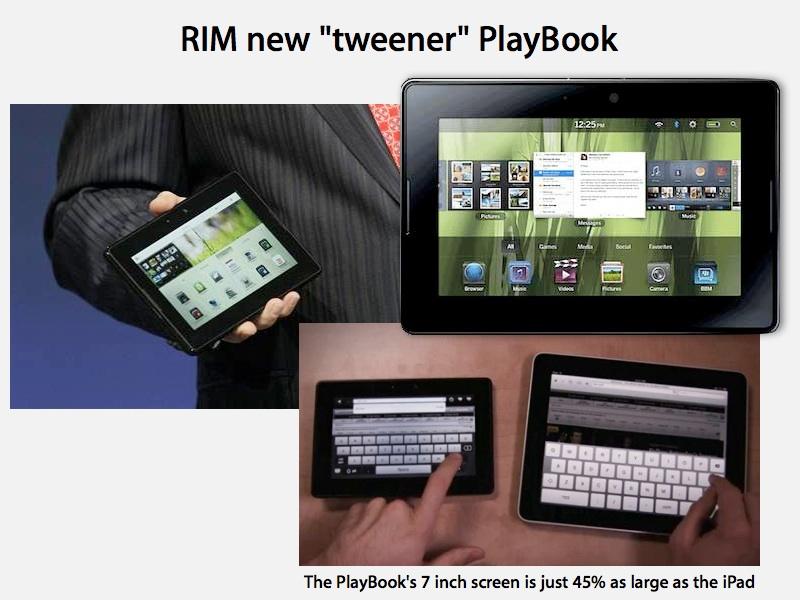RIM to craft PlayBook to run Android apps but fears Oracle lawsuit
As noted in a report by Bloomberg, RIM hopes to match the capabilities of a new crop of Android 3.0 tablets, which will similarly incorporate backward support for existing Android Market titles.
Unlike Motorola, Toshiba and other Android 3.0 Honeycomb licensees however, RIM is reportedly concerned that using Google's Dalvik virtual machine may expose it to the ongoing patent dispute between Oracle and Google.
Analysts detail the technology required
RBC analyst Mike Abramsky wrote in a note to clients that, "the capability [to run existing Android apps] may be implemented as a 'layer' on top of PlayBook's QNX OS, which would to us suggest emulation. (QNX is already compliant with standards (POSIX) that would allow modified Android apps to run.)"
Abramsky added, "RIM may not have gone with Google's Dalvik VM emulator but may have chosen another solution (home grown or acquired), possibly to avoid legal issues."
Peter Misek, an analyst with Jefferies & Co and cited by Bloomberg, was similarly credited with observing that RIM's "opting for QNX also put the PlayBook a step closer to Android as they share the common POSIX standard."
How RIM's PlayBook would host existing Android apps, which are programs written in Java and converted into Dalvik Executable (.dex) files, without actually implementing Google's Dvalik virtual machine to do so, is not explained.
It is also not clarified how exactly POSIX compliance in the PlayBook's underlying QNX operating system kernel has anything to do with support for Android apps. Both the BSD-based kernel in Apple's iOS and the Linux kernel used by HP's webOS similarly support POSIX conventions, but this does not mean they will run Android apps, which are not written to POSIX APIs but rather in high level Java and targeted to the very specific design of a specific version of Android's Dvalik virtual machine.
RIM likely more cautious than Google, Android licnesees
Oracle brought legal action against Google for allegedly infringing upon Java-related intellectual property rights that it now owns following its acquisition of Sun. Google maintains that its implementation of Dvalik is different enough to not require the payment of any licensing royalties to Oracle.
RIM may be less confident about the decision of the courts regarding matters of intellectual property infringement following its harrowing experience with patent troll NTP, which accused the BlackBerry maker of infringing its wireless email patents in a case that dragged along through much of the last decade.
NTP was not only awarded millions in damages by the court but also pushed an injunction that would have shut down RIM's US operations if the US government hadn't interceded on behalf of all of its Blackberry users that it said would be severely impacted and argued that national security would be threatened. RIM eventually settled with NTP for $612.5 million in damages.
Developers likely to target the lowest common denominator
The story of RIM's plans to support Android apps in some fashion, while not unanticipated news, was well received by the market. The report cited mobile developer Wade Beavers, who runs DoApps Inc., saying "he would welcome an easier way to sell software to RIM customers. He used to make apps for BlackBerry smartphone users and now focuses on Apple and Android devices."
While the ability to run existing Android apps would help RIM put its PlayBook on a more equal footing with new Android 3.0 Honeycomb products like the Motorola Xoom, it won't also automatically enable the PlayBook to run new Android 3.0 Honeycomb apps that Google hopes to cultivate.
Existing Android 2.x apps are not optimized for tablet use, although Google demonstrated a variety of simple games (including Fruit Ninja) that can scale to fit the larger display of tablets.
Real tablet apps on the level of the iPad require more sophisticated user interface conventions than existing Android apps targeted at smartphone-sized Android devices can deliver, a factor that detracted away from the 5 to 7 inch Dell Streak and Samsung Galaxy Tab offerings.
While Google included a series of new tablet optimizations in Android 3.0 Honeycomb, PlayBook won't take advantage of them unless it is redesigned from scratch to simply be another Honeycomb tablet, rather than being something unique to RIM.
And at the same time, any potential success of PlayBook can only help limit the potential of Android 3.0 Honeycomb, because developers will be encouraged to target the lowest common denominator of Android 2.x apps to reach the largest possible audience.
In contrast, Apple introduced its iPad with backward compatibility with existing iPhone apps, but also released its own series of iWork productivity apps to kick off a new library of iPad optimized titles. The company also made it easy for existing apps to be delivered in multiple-binary versions that include both a simpler iPhone version and a more involved iPad edition. And as with iPhone before it, iPad offered no attempts to support Flash, Java or other existing platforms.
RIM will also be working to promote its own unique library of tablet apps based on a new, native SDK proprietary to RIM, as well as offering support for Adobe AIR and Flash applets and new web apps built with the forthcoming BlackBerry WebWorks. Support for all of these will be dampened if developers view PlayBook as simply another way to run their existing Android 2.x apps without any effort.
 Daniel Eran Dilger
Daniel Eran Dilger














 Amber Neely
Amber Neely
 Thomas Sibilly
Thomas Sibilly
 AppleInsider Staff
AppleInsider Staff
 William Gallagher
William Gallagher
 Malcolm Owen
Malcolm Owen
 Christine McKee
Christine McKee










25 Comments
Sound like RIM is building a "Frankentablet."
Abramsky added, "RIM may not have gone with Google's Dalvik VM emulator but may have chosen another solution (home grown or acquired), possibly to avoid legal issues."...
Hmmm? How did that somehow become this: "RIM PlayBook to run Android apps but fears Oracle lawsuit" ?
Abramsky's just another ANALysist, which hardly equates to RIM actually saying/announcing anything... as the headline of this 'article' would have one (mis)believe.
Abramsky added, "RIM may not have gone with Google's Dalvik VM emulator but may have chosen another solution (home grown or acquired), possibly to avoid legal issues."...
Hmmm? How did that somehow become this: "RIM PlayBook to run Android apps but fears Oracle lawsuit" ?
Abramsky's just another ANALysist, which hardly equates to RIM actually saying/announcing anything... as the headline of this 'article' would have one (mis)believe.
Did you read the actual article, not the Apple-filtered one that this site posted?
Seems the iFans are a bit afraid.
If they go that route, nobody will write native apps for them. and the experiences of the Android apps on Playbook will always be subpar.
Did you read the actual article, not the Apple-filtered one that this site posted?
Seems the iFans are a bit afraid.
Is RIM paying you? They should be. Call Balsillie and ask him for a Canadian dime.